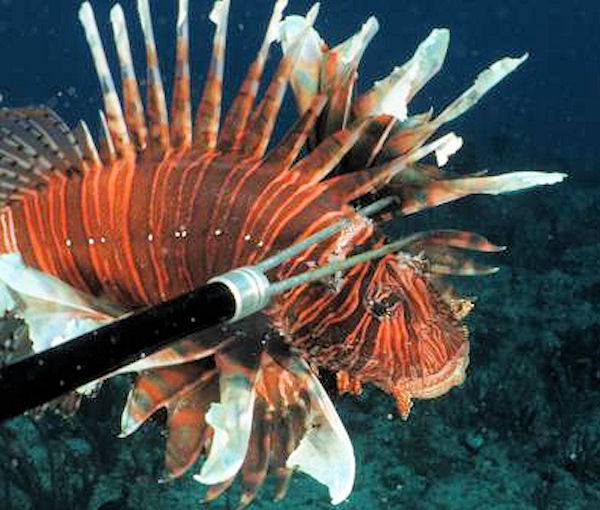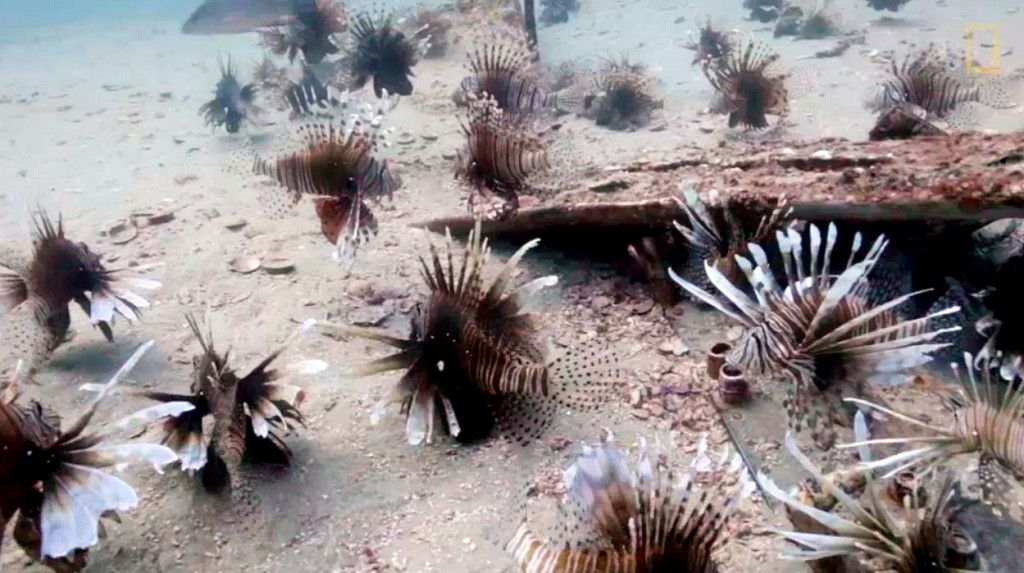Lionfish, a brightly-colored, spiny fish that are not native to Florida, are taking over our reefs. How can we fight off this alien invasion? Floridians have come together to fight them off and save the reef.
Lionfish, a brightly-colored, spiny fish that are not native to Florida, are taking over our reefs. How can we fight off this alien invasion? Floridians have come together to fight them off and save the reef.
Lionfish look like the red and white Las Vegas showgirls of the sea. Chances are, you’ve seen them in one aquarium or another—their ornate fins and 18 spines set them apart from the other reef fish. However, while they are beautiful to look at, lionfish are an invasive species, meaning they are not native to Florida. Because lionfish aren’t native to Florida’s ecosystems, they have no natural predators. Couple that with the fact that lionfish reproduce like rabbits, and they eat anything they can fit in their mouths, and we have a serious problem.
How to Fillet a Lionfish – Video
What are Lionfish?
Lionfish are venomous fish that originate from Indonesia. They have 18 venomous spines on their body, and are incredibly adaptable. Divers have spotted lionfish on deep-sea wrecks of 200 feet, all the way up to 15 feet of warm reef. With the capacity to eat something 30 times their stomach volume, they prey on everything, and have a voracious appetite, on top of the fact that they breed about three to four times faster than Florida’s native fish species.
How did Lionfish get to Florida?
Scientists aren’t exactly sure when lionfish came to Florida, but there are a few theories. Some people believe that the entire population originates from six lionfish that were accidentally released into Biscayne Bay when Hurricane Andrew hit
cHow to Fillet a Lionfish – Video
Others believe that the lionfish made their voyage over in the ballast of cruise ships; boats will purposefully take on water in one area to balance their buoyancy, and then release that water when it isn’t necessary anymore.
The Problem with Lionfish
Because they are an invasive species, lionfish have no natural predators, so they exist outside the local Gulf and Caribbean ecosystems. At a reproduction rate of three to even four times the rate of any other fish, plus the abundance of food, in addition to the fact that they have no natural predators, it’s no wonder the lionfish population has grown by 700% in some areas.
What’s more, lionfish are decimating the local reef fish. Spearfisherman Jarrad Thomason, who has frequented Florida’s reef for the past 25 years, says that he noticed lionfish in deep water about 5 years ago, and now he hardly goes on a dive without seeing them.
“Wherever they are, there are definitely less fish in that area—especially fish that are good to spear. I absolutely think they are affecting the fish populations particularly infested areas, especially because they can consume much larger fish than they are.”
Native reef fish take an average of 3-4 years to reach reproductive maturity, while lionfish take about 6 months. One female spawns about 2 million eggs per year, and the fish are known to eat up to 30 times their own stomach volume. Lionfish are reproducing at an alarming rate, and they are eating the other fish before they are even able to reproduce.
What’s Being Done?
Divers,
Hunting Invasive Lionfish Help’s Protect Coral Reefs

Unfortunately, these initiatives might not be enough. Between the rising ocean temperatures driving some species north in search for cooler waters, coral reef bleaching and dying, and unchecked damages left by oil spills, Florida’s delicate ocean ecology may not survive invasion by such a fearsome predator.
What Can We Do?
FWC does not require any sort of fishing permit or license to kill lionfish. Additionally, local dive shops all over Florida host their very own Lionfish Derbies and Lionfish Removal Days, where they show you how to catch, clean, and cook your own lionfish! Locals further from the shore can request lionfish from their local grocery stores, and do their part by cooking and eatingthese white, flakey fish.

